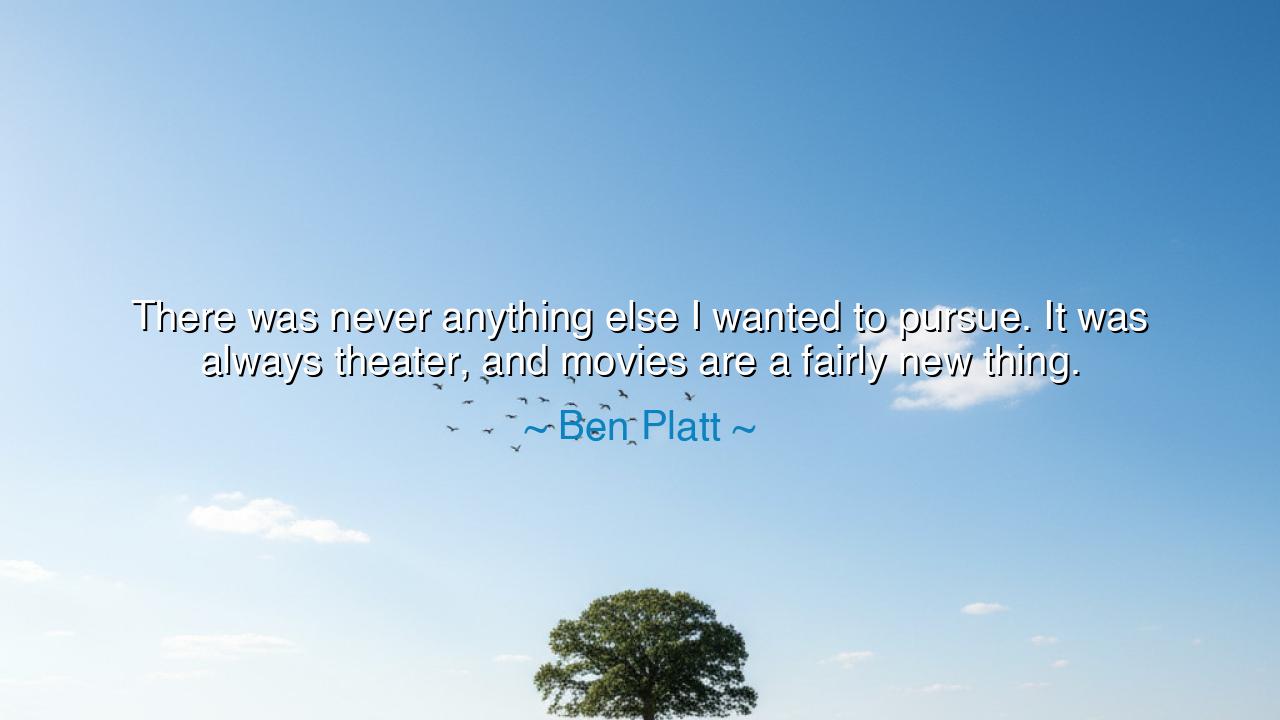
There was never anything else I wanted to pursue. It was always
There was never anything else I wanted to pursue. It was always theater, and movies are a fairly new thing.






In the grand sweep of human history, there are those whose hearts burn with a singular passion, a calling that becomes the very essence of their existence. Ben Platt, in his reflection on his life’s work, speaks to this unwavering dedication when he says, "There was never anything else I wanted to pursue. It was always theater, and movies are a fairly new thing." In these words, we hear the ancient wisdom of devotion—the understanding that there are some pursuits so deeply ingrained in the soul that they become not just a part of life, but its purpose. For Platt, as for many before him, the pursuit of the stage was not a choice, but a calling, a force greater than anything else, one that could not be ignored or forsaken.
In the ancient world, the theater was revered not only as entertainment but as a form of communication between humanity and the divine. The Greek playwrights, like Sophocles and Euripides, wrote not simply for the pleasure of the audience, but to confront the great questions of existence. The stage was where heroes were born, where truths were revealed, and where the very fabric of society was examined. Those who stood upon the stage were not merely actors, but messengers—vessels through which the deeper meanings of life were expressed. Just as the ancient Greeks believed in the power of theater to influence and shape the soul, so too does Platt speak of his dedication to this craft, understanding that his role is to be a part of something far greater than himself.
There is a timeless truth in the idea of dedicating oneself entirely to a singular path. Alexander the Great, though a conqueror of nations, was driven by a singular vision: the spread of Greek culture across the known world. His military triumphs were not distractions from his true purpose; they were tools to advance his passion. Similarly, Ben Platt speaks of theater not as one option among many, but as the only purpose that could fill the depths of his being. The theater became his calling, his destiny, a place where he could truly express himself and connect with the larger tapestry of humanity. It was not a passing whim but the soul’s true desire, much like the warriors of old whose heart and sword were one.
This devotion to one’s craft, however, does not mean that other pursuits are unworthy or unimportant. Rather, it speaks to the depth of commitment required to master one’s art. The advent of movies, as Platt mentions, is but a new medium, a tool that can be used to tell stories and to convey the very same truths that theater has long offered. The moving picture may be a modern invention, but its origins are rooted in the same desire to connect, to communicate, and to express the soul’s longings. The great actors of old, such as Marlon Brando and Laurence Olivier, began their careers on the stage, where the theater first molded their craft before they ventured into the realm of cinema. It was not the medium itself that was important but the message that they carried.
The lesson of Platt’s words is this: we are not bound to the fleeting whims of the world, but to the enduring call of our true passion. Just as Platt found his path in the theater and held steadfast to it, we too must recognize that purpose is often singular and clear. It is not enough to dabble in many things; true fulfillment lies in the dedication to the one thing that stirs the soul, that sets the heart alight with passion. Whether it is the arts, the pursuit of knowledge, or the service of others, the greatness of life is found not in the multitude of directions we take, but in the strength of our commitment to the path that calls us.
In the ancient wisdom of the Buddhist monks, there is a teaching that speaks of devotion as the key to unlocking enlightenment. The monks, in their simplicity, dedicate themselves to a singular path—whether it is through meditation, study, or the act of service—and in this commitment, they find the peace and purpose they seek. In the same way, Ben Platt found his peace in the theater, and it was through this single pursuit that he could connect with the world and express the very essence of his being. The lesson is clear: devote yourself to your craft, to your passion, and let it shape and guide you.
As you walk through life, remember this: commitment to your purpose is the key to fulfillment. Like Ben Platt, find that which calls to you with the greatest strength, and let that be your guiding star. Do not be swayed by the distractions of the world, but stay true to the path that fills your heart with meaning. And in doing so, you will find not only success, but inner peace and purpose, for it is in dedication that we discover the true richness of life. Choose your passion with wisdom, and let it be the fire that sustains you through the trials and triumphs of life.






AAdministratorAdministrator
Welcome, honored guests. Please leave a comment, we will respond soon